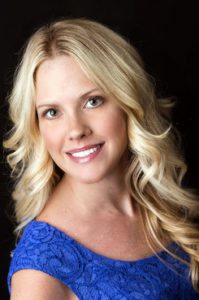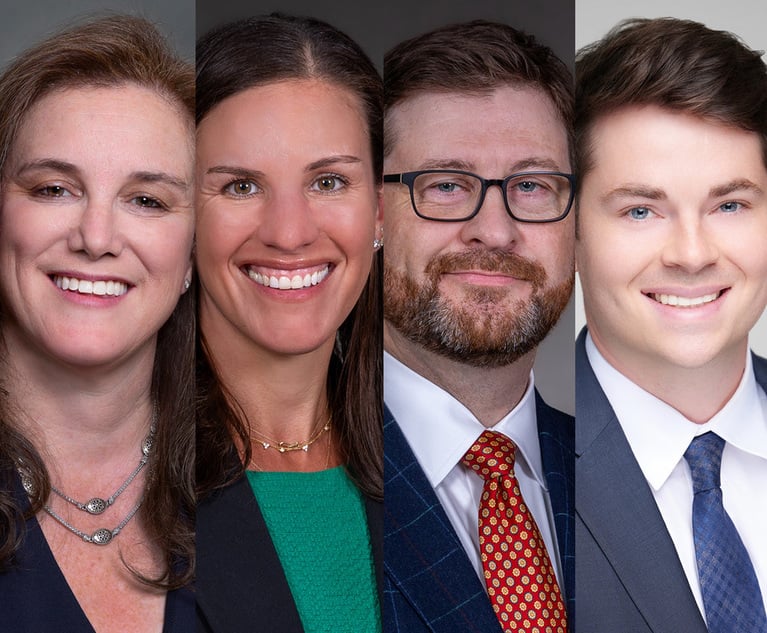 Photo: Zenzen/Shutterstock.com
Photo: Zenzen/Shutterstock.com
When Meagan Martin Powers and Tricia Meyer launched their law firms, they weren't thinking about the advantages of running a woman-owned firm in terms of marketing, recruiting and winning business.
In fact, neither lawyer set out to hire only women lawyers. But it turned out that all four of the lawyers at Dallas-based Martin Powers & Counsel, which opened its doors in April, are women. The same is true of the 11 lawyers at Meyer Law in Chicago.
Martin Powers, the sole owner of Martin Powers, said she is still learning about how her woman-only firm can benefit from that status.
But Meyer, whose nine-year-old tech law boutique is certified as a women-owned business, said the designation has helped her firm get work. Meyer's law firm works with clients in the tech sector on corporate, contracts, employment, intellectual property, fundraising and privacy matters.
 Tricia Meyer of Meyer Law.
Tricia Meyer of Meyer Law.“I think tech is very male-dominated, I think the legal industry is very male-dominated,” said Meyer, who worked in-house for several tech companies prior to opening her own law firm. Being all women “is a differentiating factor for us.”
She added, “I actually found some male prospective clients reach out, interested to talk with us, just based on that we are all-women.”
Martin Powers & Counsel and Meyer Law are among many firms around the country that—either by design or happenstance—are women-owned. Some are certified by the Women's Business Enterprise National Council (WBENC), which enables them to bid on government work and adds to their credibility when seeking corporate work. According to the WBENC, more than 15,000 businesses are certified.
Lawyers at a number of women-owned firms around the country echoed Meyer's sentiments about the benefits of being women-led, as corporations require their outside counsel to include women and minority lawyers on their teams.
“For a number of our clients, the fact that we are women-owned is a positive, not negative. I don't know if that is a negative to anybody,” said Lisa Brown, a partner in San Francisco at GBG, which launched five years ago.
When Brown and two of her male partners left Paul Hastings to form GBG, they did not set out to form a women-owned boutique, she said. But now the firm is owned by three women and one man. Once the ownership balance shifted, Brown said, it would have been short-sighted to leave that on the table and not seek certification.
“We want to show that you can be a top-notch employment firm and be women-owned,” she said, adding that the firm is more attractive to clients and to prospective employees as a result.
Gayla Crain, who was a founder of the women-owned Spencer Crain Cubbage Healy & McNamara in Dallas, said, “Our business development efforts and our marketing were so much easier at a women-owned firm than at regular firms.”
Crain declined to identify specific clients, but she said general counsel were very receptive when she pitched them as a Spencer Crain lawyer—often more receptive than when she practiced at a larger firm not owned by women.
“The doors were wide open. That was 2008. We did get business,” she said.
But Crain, a labor and employment lawyer, is now of counsel at Gray Reed & McGraw in Dallas. She said Spencer Crain closed in 2014, after a six-year run, because the partners made a decision to go separate ways, largely because of the administrative burden of running a firm that at its peak had about 20 lawyers and offices in Dallas and Houston.
After the Intro, 'Deliver the Goods'
A certification alone only goes so far.
Kent Zimmermann, a law firm consultant with Zeughauser Group, said women-owned status creates opportunities, but does not guarantee business.
“Being a women-owned firm opens a lot of doors to getting audiences with sought-after clients, but my sense is also although it opens the door, if you don't have the quality, it's not a game-changer,” Zimmermann said.
Dawn Estes, a founder of Dallas' Estes Thorne & Carr, said some clients view her 11-year-old firm's women-owned status as an important consideration, while some clients don't care. She said the fact that the firm has always been 100% women-owned doesn't create long-term success “unless you can deliver the goods.”
Estes said shortly after the litigation firm was formed, it obtained WBENC certification, and also joined the National Association of Minority and Women Owned Law Firms (NAMWOLF). Both have helped the firm get business over the years, she said.
Estes said she and the other equity partners ask themselves from time to time if there is still a need for smaller women-owned firms. The answer is yes, she said.
“We show other women it can be done … the fact we are still here is still a thing that I think a lot of women applaud,” she said.
Of Estes Thorne's 14 lawyers, 13 are women, including all four equity partners.
Estes said her firm has done work for the Federal Deposit Insurance Corp. and also represented Parkland Hospital in Dallas—the women-owned certification helped land that work—but government work has never accounted for more than 25% of the firm's revenue.
She said the FDIC in particular has aggressively sought to hire women-owned and minority-owned firms. That paradigm shift is moving into the corporate world, Estes said, noting that one business client she declined to identify has also made a similar request.
“That is great,” she said. “That's how somebody with a purse is doing something to level the playing field,” she said.
Estes said her firm does most of its business with corporations, and larger companies in particular are pushing their outside counsel to use women and minorities on their work. She believes some of that effort is the result of more women lawyers moving up the ranks of in-house departments and making hiring decisions.
Melanie Okon agreed with Estes on that point, suggesting that successful women are inclined to help other women. She said the fact her litigation boutique, Okon Hannagan, is women-owned may tip the scales, because clients do care about diversity.
“It's an advantage to them. When they get to send work to us, they can report it as diversity spend,” said Okon, who was an equity partner in Estes Thorne but left the firm along with Susan Hannagan three years ago. Her three-lawyer firm is WBENC certified.
But Okon said it is nevertheless difficult to land big lawsuits, in part because of the size of her firm.
On the first pass, we aren't getting the bet-the-company cases because those big … firms are,” she said.
On the flip side, Okon notes that one of her clients is Republic Waste, a trash and landfill company, and her contact there is a man she went to law school with who is very interested in diversity in hiring.
Not all women-owned firms are certified. Gabrielle Sellei, a solo in Philadelphia since 2015 who does employment, business and entertainment law, said the designation is useful to firms that want to do work for Fortune 500 companies and government agencies. But she didn't feel compelled to go through the red tape.
“Many of my clients appreciate the fact that I am a women-owned business. Many of my clients are themselves women-owned business, but they are not trying to check a box or fulfill some sort of outside requirement,” she said.
Instead of sticking around at a larger firm to follow the equity partner track, Sellei said, more women attorneys are realizing that they will have more flexibility and even higher profit by opening their own firms.
“At least in my experience, the practice of law requires a laptop, a telephone, some experience, some knowledge, some judgment, and not much else,” Sellei said. “I think what a lot of people don't realize until they get into this is that the barriers to entry are absolutely kind of tiny.”
Read More
This content has been archived. It is available through our partners, LexisNexis® and Bloomberg Law.
To view this content, please continue to their sites.
Not a Lexis Subscriber?
Subscribe Now
Not a Bloomberg Law Subscriber?
Subscribe Now
NOT FOR REPRINT
© 2025 ALM Global, LLC, All Rights Reserved. Request academic re-use from www.copyright.com. All other uses, submit a request to [email protected]. For more information visit Asset & Logo Licensing.
You Might Like
View All


Trending Stories
- 120 New Judges? Connecticut Could Get Wave of Jurists
- 2Orrick Loses 10-Lawyer Team to Herbert Smith in Germany
- 3‘The US Market Is Critical’: KPMG’s Former Head of Global Legal Services On the Legal Arm of the Big Four Firm Entering the US
- 4Justice Marguerite Grays Elevated to Co-Chair Panel That Advises on Commercial Division
- 5McDermott Continues UK Growth With Another Partner Hire in London
Who Got The Work
J. Brugh Lower of Gibbons has entered an appearance for industrial equipment supplier Devco Corporation in a pending trademark infringement lawsuit. The suit, accusing the defendant of selling knock-off Graco products, was filed Dec. 18 in New Jersey District Court by Rivkin Radler on behalf of Graco Inc. and Graco Minnesota. The case, assigned to U.S. District Judge Zahid N. Quraishi, is 3:24-cv-11294, Graco Inc. et al v. Devco Corporation.
Who Got The Work
Rebecca Maller-Stein and Kent A. Yalowitz of Arnold & Porter Kaye Scholer have entered their appearances for Hanaco Venture Capital and its executives, Lior Prosor and David Frankel, in a pending securities lawsuit. The action, filed on Dec. 24 in New York Southern District Court by Zell, Aron & Co. on behalf of Goldeneye Advisors, accuses the defendants of negligently and fraudulently managing the plaintiff's $1 million investment. The case, assigned to U.S. District Judge Vernon S. Broderick, is 1:24-cv-09918, Goldeneye Advisors, LLC v. Hanaco Venture Capital, Ltd. et al.
Who Got The Work
Attorneys from A&O Shearman has stepped in as defense counsel for Toronto-Dominion Bank and other defendants in a pending securities class action. The suit, filed Dec. 11 in New York Southern District Court by Bleichmar Fonti & Auld, accuses the defendants of concealing the bank's 'pervasive' deficiencies in regards to its compliance with the Bank Secrecy Act and the quality of its anti-money laundering controls. The case, assigned to U.S. District Judge Arun Subramanian, is 1:24-cv-09445, Gonzalez v. The Toronto-Dominion Bank et al.
Who Got The Work
Crown Castle International, a Pennsylvania company providing shared communications infrastructure, has turned to Luke D. Wolf of Gordon Rees Scully Mansukhani to fend off a pending breach-of-contract lawsuit. The court action, filed Nov. 25 in Michigan Eastern District Court by Hooper Hathaway PC on behalf of The Town Residences LLC, accuses Crown Castle of failing to transfer approximately $30,000 in utility payments from T-Mobile in breach of a roof-top lease and assignment agreement. The case, assigned to U.S. District Judge Susan K. Declercq, is 2:24-cv-13131, The Town Residences LLC v. T-Mobile US, Inc. et al.
Who Got The Work
Wilfred P. Coronato and Daniel M. Schwartz of McCarter & English have stepped in as defense counsel to Electrolux Home Products Inc. in a pending product liability lawsuit. The court action, filed Nov. 26 in New York Eastern District Court by Poulos Lopiccolo PC and Nagel Rice LLP on behalf of David Stern, alleges that the defendant's refrigerators’ drawers and shelving repeatedly break and fall apart within months after purchase. The case, assigned to U.S. District Judge Joan M. Azrack, is 2:24-cv-08204, Stern v. Electrolux Home Products, Inc.
Featured Firms
Law Offices of Gary Martin Hays & Associates, P.C.
(470) 294-1674
Law Offices of Mark E. Salomone
(857) 444-6468
Smith & Hassler
(713) 739-1250






